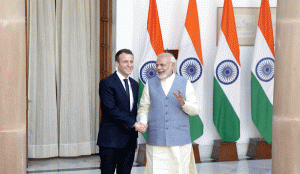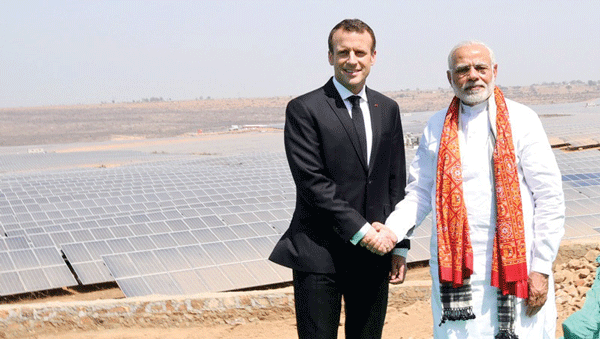French President Emmanuel Macron paid visit to India from March 10 to 12.He was received at the airport by Prime Minister Shri Narendra Modi. Mr. Macron was accompanied by his wife Brigitte Marie-Claude Macron, besides senior ministers from his Cabinet. The two leaders PM Modi and President ShriEmmanuel Macron co-hosted the Founding Summit of the International Solar Alliance in New Delhi on 11 March 2018. The leaders held wide ranging and constructive discussions and underlined the growing convergence between the two countries on regional and international issues. On the occasion of the 20th anniversary of the strategic partnership between India and France, the first to be established by India, the two leaders reaffirmed their commitment to furthering it and decided to take it to a new level by agreeing to hold biennialsummits between the Prime Minister of India and the President of the French Republic.
Both leaders agreed to deepen and strengthen the bilateral ties based on shared principles and values of democracy, freedom, rule of law and respect for human rights. A major initiative from the visit is the ‘International Solar Alliance’ to be led by India and France, which will give impetus to the international effort to harness solar energy so as to provide the world with clean, non-polluting fuel and try to reduce threat of increasing carbon emission. President Emmanuel Macron reaffirmed support of France for India’s candidature for a permanent membership of the UN Security Council. France and India share common concerns and objectives in the field of non-proliferation of weapons of mass destruction. During the French President visit, both countries signed an agreement to expedite the world’s largest projectJaitapur nuclear power plant, with the aim of commencing work at the site around the year-end
Both countries singed a number of mutual agreements and memorandum of understanding as follow:

–Agreement between India and France on the Prevention of Illicit Consumption and Reduction of Illicit Traffic in Narcotic Drugs, Psychotropic Substances and Chemical Precursors and Related Offences
–India-France Migration and Mobility Partnership Agreement
–Agreement between India and France to facilitate Mutual Recognition of Academic Qualifications
–Memorandum of Understanding between Ministry of Railways and SNCF Motilities, France on technical cooperation in the field of Railways.
–Letter of Intent between India and France for creation of a permanent Indo-French Railways Forum.
–Agreement between India and France regarding the provision of reciprocal logistics support between their Armed Forces
Memorandum of Understanding (MoU) between India and France on cooperation in the field of Environment
–Agreement between India and France on cooperation in the field of Sustainable Urban Development
–Agreement between India and France regarding the exchange and reciprocal protection of classified or protected information
Implementing Arrangement between Indian Space Research Organisation (ISRO) and Central National D’EtudesSpatiales (CNES) for pre-formulation studies of a Maritime Awareness Mission
–Industrial Way Forward Agreement between Nuclear Power Corporation of India Ltd, and EDF, France
–Bilateral Arrangement between India and France on cooperation in the matter of Hydrography and Maritime Cartography
–Credit Facility Agreement between India and France of Euros 100 million for funding of the Smart City Projects through a Challenge Process
–Memorandum of Understanding between National Institute of Solar Energy (NISE), Ministry of New & Renewable Energy and the National Solar Energy Institute (INES), France.
solar power plant inagurated in varanasi
During the visit French President Emmanuel Macron along with Prime Minister visited Varanasi. Both leader jointly inaugurated the biggest solar power plant solar power plant of the state at Dadar Kalan village of Chhanvey block in Mirzapur district on March 12. Built at a cost of around Rs. 500 crore by French firm ENGIE, the 100 MW solar plant has come up at Dadar Kalan village on the hilly terrain of the Vindhyas range. Some 1,18,600 solar panels have been set up in over 380 acres. The solar plant will generate 15.6 crore units of electricity annually, which is about 1.30 crore units per month. The electricity would be transmitted to Mirzapur’s Jigna sub-station which belongs to the Uttar Pradesh Power Corporation Ltd. Prime Minister Modi also pledged to generate 175 gigawatts (GW) of electricity in India from renewable energy sources by 2022, out of which 100 GW would be generated from solar power. After inauguration From the two leaders visited Deen Dayal Hastkala Sankul – a trade facilitation centre in Varanasi. President Macron and Prime Minister Modi also visitedthe Varanasi’s Assi ghat, where the two leaders took a boat ride on the ghats of the Ganga – from Assi to Dashashwamedh ghat.
joint statement in cooperation
In a joint statement reaffirmed that the strengthening of the India-French technological cooperation on renewable energy was a common priority for encouraging the emergence and dissemination of innovation in all the sectors. They stressed the importance of mobilizing public and private funds to support the development of solar energy. In this regard, they welcomed the establishment, within the International Solar Alliance, of an international committee of chambers of industry, and the willingness of MEDEF, SER, FICCI and CII among others to join it. Prime Minister Modi and President Macron noted with satisfaction the excellent Indo-French cooperation on sustainable cities and Smart Cities, marked by numerous cases of innovation sharing and fruitful collaborations between French and Indian stakeholders. They welcomed the exemplary cooperation programme in the three Smart Cities of Chandigarh, Nagpur, and Puducherry, and the extension of AFD’s technical assistance programme under the framework of this Mission. They welcomed the signing of the loan agreement between the AFD and the Government of India for 100 million euros in support of the Smart Cities Mission. They also called upon all countries to work towards rooting out terrorist safe havens and infrastructure, disrupting terrorist networks and their financing channels, and halting cross-border movement of terrorists like Al Qaeda, Daesh/ISIS, Jaish-e-Mohammed, HizbulMujahideen, Lashkar-e-Tayabba, and their affiliates as well as terrorist groups threatening peace and security in South Asia and the Sahel region.


